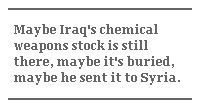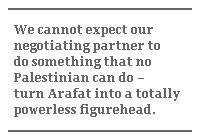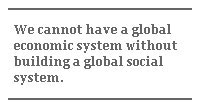‘Let NATO Take Charge of Iraq’s Security’ - Clinton
‘Let NATO Take Charge of Iraq's Security' - Clinton

NEW HAVEN: In an exclusive interview with YaleGlobal Online on October 31, former US President Bill Clinton offered his own vision about how best to achieve security in Iraq while simultaneously increasing the stake of the international community in ensuring a successful transition to civilian rule. He argued that regardless of how countries felt about the US-led military action, the imperative must now be to rebuild the country and stabilize a rapidly deteriorating situation.
When asked about how the US could regain international support for its apparently unraveling Iraq policy, Clinton said that supporting UN Secretary General Kofi Annan's Madrid donor conference was "a big step in the right direction." He also added "the best thing to do would be to try to get NATO to be designated by the United Nations as the security force acting on behalf of the UN." This would internationalize the mission and boost its legitimacy, without necessarily weakening overall US command. Clinton said, "the US could still have a dominant but not necessarily controlling position if the commander of NATO is an American." That would also "give the Germans, the French, and the Canadians a way to come into Iraq and not feel that they were part of a unilateral enterprise." Such a move would also show the Iraqi people that the international community was fully engaged in efforts to protect law and order and nurture movement towards self-government. Clinton said the US didn't have to control Iraq to save it. "Whether you think we did the right or wrong thing, we now have a vested interest in investing in Iraq, trying to get people's lives normal again and helping them to become self-governing. We will have much more credibility if we internationalize more both the nation-building and the security."

During the interview Clinton admitted to being a little perplexed that no weapons of mass destruction have been found in Iraq. "I was not surprised that no weapons were found," he said, "but what I expected them to find was some of the unaccounted for stocks."
Clinton denied having any knowledge about Hussein's efforts to obtain uranium from Africa, saying "I knew nothing about any of this nuclear business - Niger, the yellow cake and all that," he said. But for eight years he had monitored the UN and American intelligence regarding Iraqi WMD capability at the beginning of the first Gulf War. He said that in 1998, when Saddam Hussein threw out the UN inspectors, the US "knew that there were unaccounted for stocks of at least two biological agents, Botulinum and Aflatoxin, and two chemical agents, VX and Ricin." US and British forces then conducted four days of air strikes against suspected biological/chemical weapons sites. But, Clinton said, "we obviously had no idea whether we destroyed all the stuff, none of it, or something in between. I just didn't believe that we possibly had destroyed all of it."

Clinton admitted, "I still don't know what the truth is. Maybe it's still there, maybe it is buried, maybe he sent it to Syria." Asked if the chemicals may still be found, he said, "look, they are still finding canisters and pipes and weapons in underground caves. So they still might find something. It's a very large country."
Clinton said that both the US and Europe have made mistakes on Iraq. For the US not to let the UN inspectors finish before starting the conflict, he says, was a mistake. Similarly, the French and German position of opposing regime change even if Saddam obstructed inspectors was equally damaging. "I think everybody in the whole mix, except for Tony Blair, basically mishandled that. But we are where we are. I still believe that on balance we and Europe will be working more closely than ever before because we have no choice."
Regarding the ailing Middle East Roadmap, Clinton said that a necessary first step was to get a functioning government headed by Abu Ala (also known as Ahmed Qurei) and let him find the best way to deal with Arafat. "If Arafat is stripped of all power," he said, "he would have no incentive to have the security forces help to maintain peace." Clinton praised President Bush for supporting Abu Ala but cautioned, "we cannot expect our negotiating partner to do something that no Palestinian can do, which is to represent the PLO and the Palestinian elements and in effect turn Arafat into a totally powerless figurehead." He added, "in the end, you have to negotiate with your partners as you find them."

He said that moderate Palestinians have made it possible for Abu Ala to make a compromise on the Palestinian right of return - which is fundamental. The idea behind the Oslo Accord, he explained, was that there would be two states to share the future. Neither would be exclusively Jewish or exclusively Palestinian Muslim. But the Palestinians "can't have an unlimited right of return both in the new state of Palestine and the old Israel, which will now be about half the size it was." However, Clinton added that for most Israelis and a lot of American Jews, the trauma of the last three years has made it difficult to consider such long-term plans. "They want to see a little capacity to maintain peace and fight terror on the part of the Palestinian government."
The former president said that despite differences that have arisen between the US and European Union about a range of issues, the shared institutions and values would prevent a lasting rift. He said a permanent split would not happen, "because we have too much in common in terms of values and interests." Clinton, however, expressed ambivalence over the European opposition to GMO (Genetically Modified Organisms). He said. "GMO is a particularly difficult issue, because it is hard to sort out what's the science and the fear of environmentally dangerous food from the desire to preserve the present structure of agriculture in some European countries - which I sympathize with but which may not have anything to do with GMO."

In the past Clinton has often likened globalization to weather. Asked how did he explains growing anger towards globalization, he quipped, "a lot of bad weather" and pointed out that two main problems were generating it. The first, he said, is that globalization does not deliver benefits to half the people on earth. The economic gains of the past two decades have been partly nullified by growing populations, especially in poorer countries. The second problem, he said, "is that globalization will not work in the end unless it spurs more internal economic growth, unrelated to trade in poor countries."
However, unlike his centrist position on Iraq, his ideas for helping developing countries to build sustainable economies place him firmly in the liberal camp. He said, "we have to recognize that we cannot have a global economic system without building a global social system." That's why there is need for more labor and environmental provisions in trade agreements, including provisions banning child labor. "We need to have a developmental agenda that includes much higher levels of aid and debt relief and other efforts to support the developing world."
He said he was encouraged to see greater interest in addressing infectious diseases, especially HIV/AIDS. Clinton praised the work of the Gates Foundation, and noted that even Christian evangelical groups have begun supporting greater spending on AIDS issues. His own foundation has succeeded in getting pharmaceutical companies to drastically lower the price of HIV/AIDS drugs for developing countries. Many European countries are coming forward to fund the distribution of these cheap drugs in needy countries. "It is moving in the right direction," he said, "but we have got a good ways to go."
Nayan Chanda is editor of YaleGlobal Online. A full transcript of this interview can be found here.